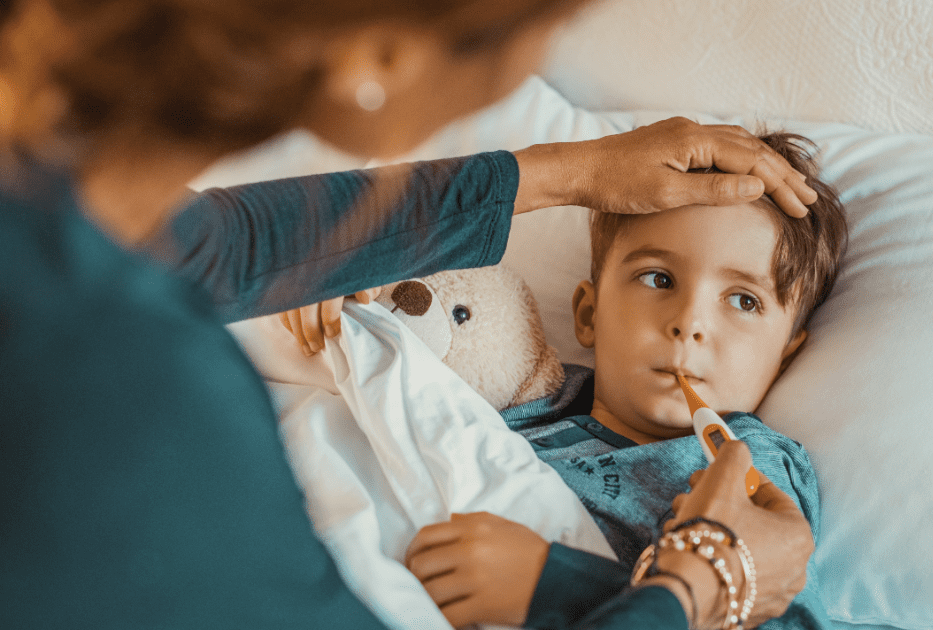Why Does My Child Fall Sick After Starting School?
Introduction
You packed their lunchbox, bought tiny shoes, and waved goodbye — only to face a cycle of sniffles, coughs, and fevers within weeks. Before panic sets in, know this: 70% of parents report increased minor illnesses in their child’s first school year (CDC, 2023). Let’s decode why this happens and how it’s secretly strengthening your child’s future health.
The Numbers Every Parent Should Know
-
Frequency:
-
Average 6–8 minor illnesses per year for children in early schooling (vs. 2–3 for home-care kids).
-
85% resolve within 3–5 days without medication (American Academy of Pediatrics).
-
-
Immunity Boost:
-
Each cold/flu trains the immune system to recognize 200–300 new germs (NIH Study, 2022).
-
Kids who attend preschool have 30% fewer sick days in elementary school (Journal of Pediatrics).
-
Why Germs ≠ The Enemy
The “School Germ Pool” Effect
-
Classrooms are diversity hubs: Exposure to 15–20 peers = 50+ new germs weekly.
-
Hand-to-mouth habits: Toddlers touch their face 10–12 times/hour (vs. 3–4 for adults), speeding germ transfer.
Immunity 101:
-
First-year “boot camp”: Initial infections trigger antibody production.
-
Long-term payoff: By age 6, school-going kids fight 60% faster against common viruses (Mayo Clinic).
Top 3 Parent Concerns (Debunked)
1️⃣ “Is it because the school isn’t clean enough?”
-
Fact: Over-sanitizing harms immunity. Mild germ exposure reduces allergy/asthma risk by 40% (NEJM Study).
-
Omkar’s protocol: Daily toy cleaning + sick-child isolation.
2️⃣ “Should I keep them home longer?”
-
Fact: Missing school delays immunity development. Send them if:
-
No fever for 24 hours (without meds).
-
Energy levels are >70% normal.
-
3️⃣ “Are recurrent illnesses harming them?”
-
Red flags (rare):
-
Fevers >104°F (40°C).
-
Symptoms lasting >10 days.
-
Labored breathing/dehydration.
-
-
Otherwise, it’s normal.
Parent Action Plan: 5 Steps to Manage (Not Fear) the Phase
-
Prevent
-
Teach “Catch It, Bin It, Kill It” for sneezes.
-
Label water bottles to avoid sharing.
-
-
Recover
-
Hydration > medication: Offer ice pops, soups, diluted juice.
-
Use saline spray (not nasal drops) for congestion.
-
-
Communicate
-
Alert the school ASAP if symptoms appear.
-
Track patterns: “Every 3 weeks” vs. “Non-stop” matters.
-
-
Boost Immunity
-
Sleep: 10–12 hours/night (critical for recovery).
-
Vitamin D: 400–600 IU daily (consult your pediatrician).
-
-
Stay Calm
-
Stress weakens kids’ immunity. Your calm = their calm.
-
Omkar School’s Health Protocol
-
Sick bay: Isolation room with trained staff
-
Parent updates: Real-time alerts for outbreaks (stomach flu, hand-foot-mouth, etc.).
When to Worry (and See a Doctor)
-
Ear infections >3x/year.
-
Green nasal discharge + fever >5 days (possible sinusitis).
-
Rashes with fever (could indicate viral/bacterial issues).
Closing Note from Omkar School
This phase is temporary, but the immunity it builds lasts a lifetime. We’re here to partner with you — not just in teaching ABCs, but in raising resilient, healthy humans.
💡 Remember: A sick child is often a sign of a working immune system, not a broken one.
Next Blog Teaser:
Blog 3: “Discipline or Restriction? What Early Schooling Actually Teaches Children”
(Sneak peek: Structured routines boost creativity by 40% — here’s how.)
.png)







